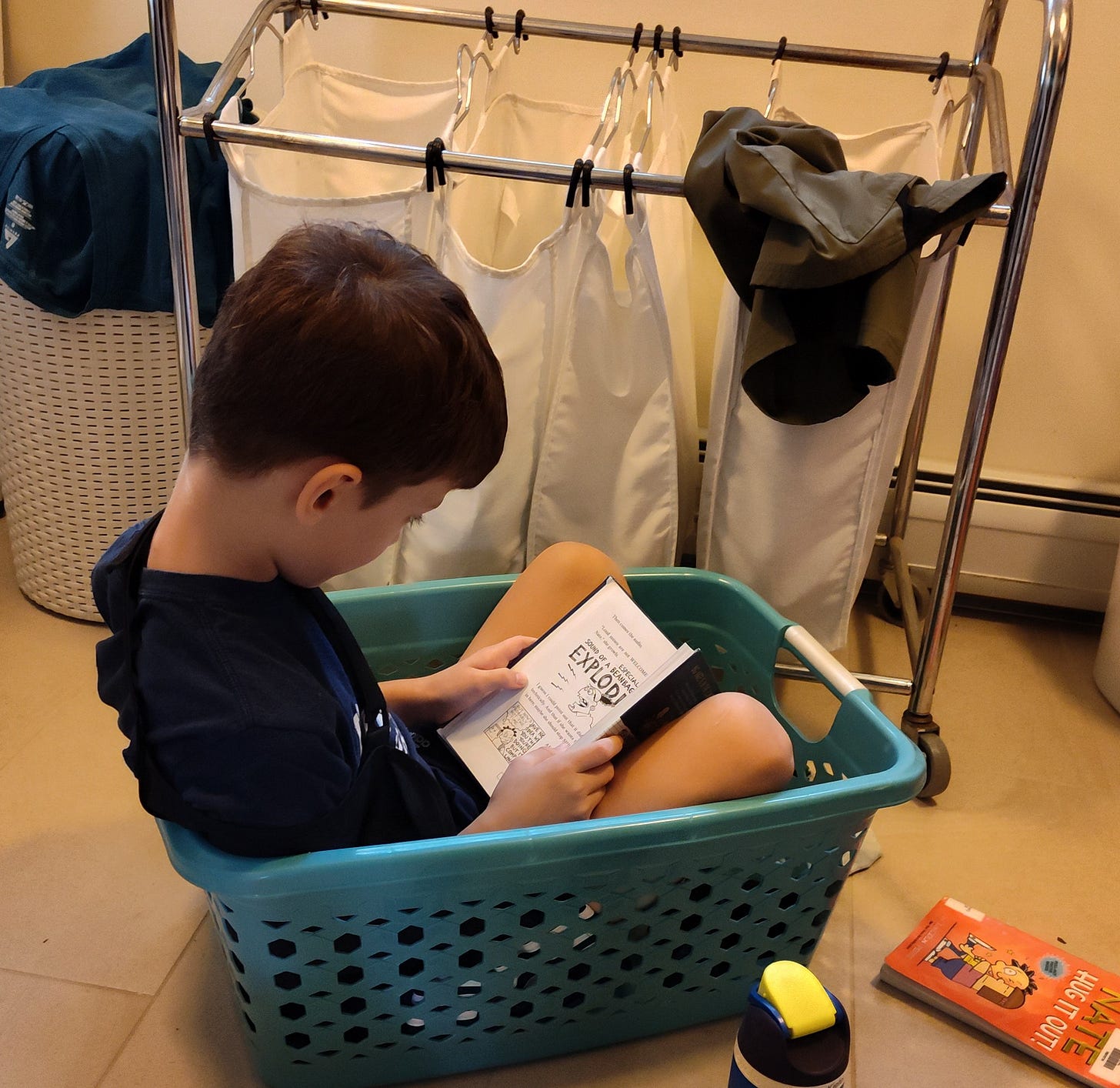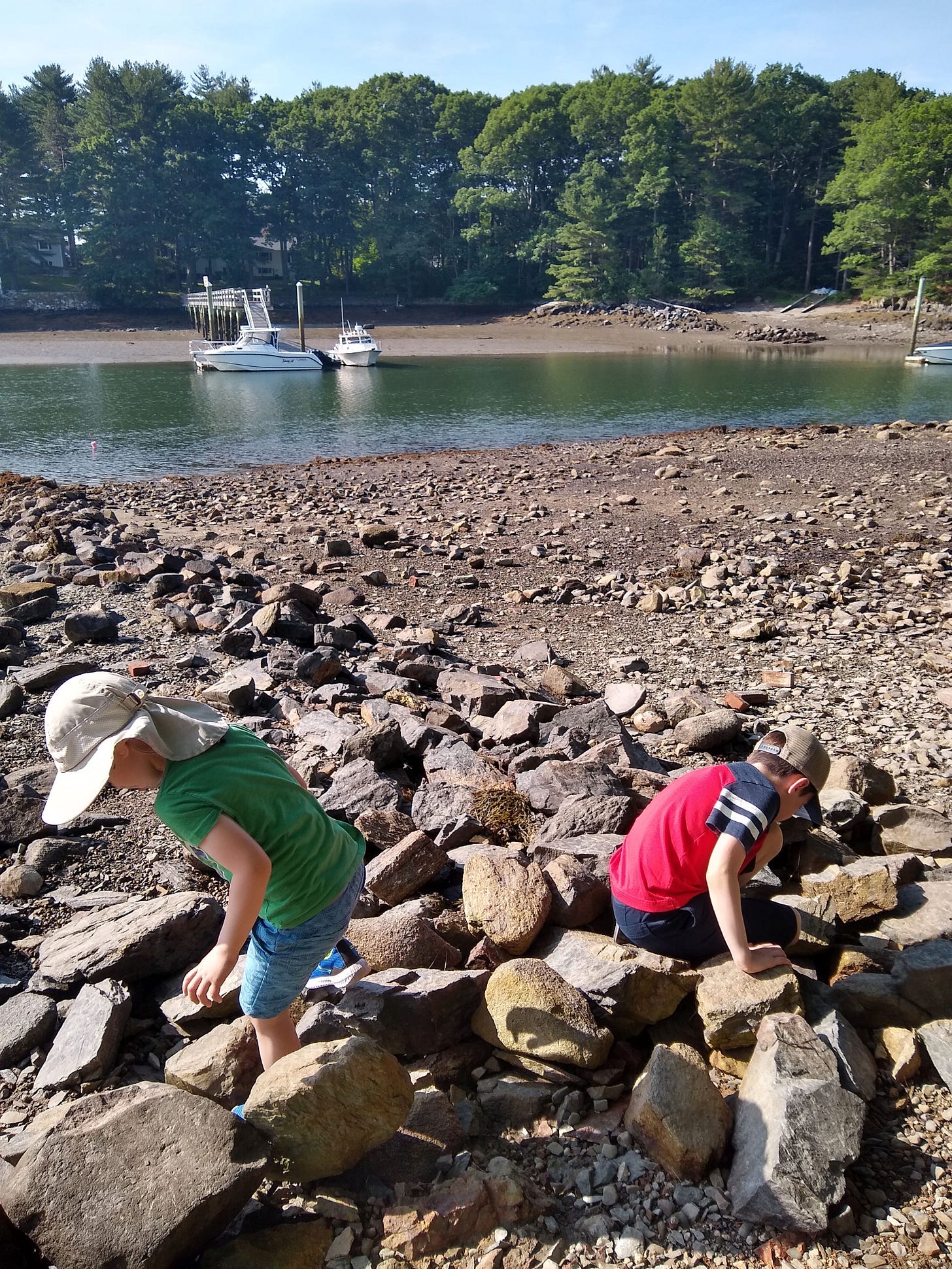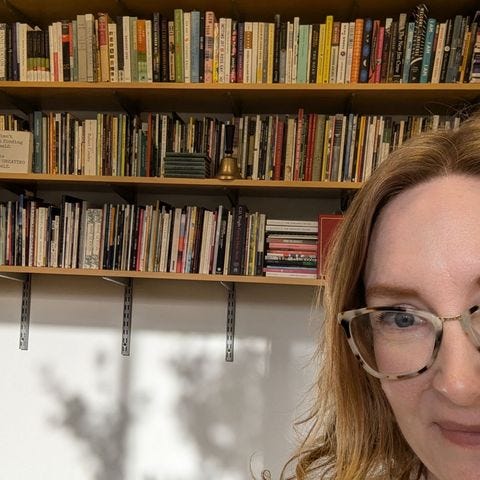"caring for children comes with inescapable reminders of how days hurdle forward"
Abbie Kiefer, author of CERTAIN SHELTER, on how having kids gave her creative work a sense of urgency and why walks are an essential part of her writing process
Hello there! Welcome to Write More, Be Less Careful, a newsletter about making space for creative practice in a busy life. My next book, The Good Mother Myth, will be out in January 2025, and you can pre-order it now!
This is a good creatures interview, a series that explores the intersection of caregiving and creative practice. I’m so excited to showcase people doing lots of kinds of caregiving—people caring for kids or pets or other family members and/or caring for space through gardening or community work or activism—and lots of kinds of creative work.
If you know (or are!) a good creature whose work we should feature, send me an email—you can just reply to this newsletter.
Today’s interview is with poet Abbie Kiefer, whose debut collection Certain Shelter, described as “a clear-eyed portrait of an aging mill town and a larger reflection on memory, making, and the significance of home,” is out now. One of my favorite poems from the book is “On ‘The Joy of Painting,’ at 3 A.M., Bob Ross Promises Anyone Can Do This,” and I think if you’ve got a fondness for those happy trees, I think you’ll love it, too. Below we talk about why Kiefer felt time “really hotfooting it” once she had kids and why sometimes she just doesn’t balance creativity and caregiving, but she tries to do both anyway.
Who do you care for?
I care for my two kids, who are 8 and 11, and I like to think my husband and I take care of each other.
What kind of creative work do you do?
I’m a writer. My creative focus is poetry, and my debut collection, Certain Shelter, launched earlier this month. I’m also a copywriter, which is a different kind of creative work. In spring and summer, I garden (which I think counts, although I’m gonna give the plants most of the credit) and I’m getting into visible mending. I’m not skilled in it yet but I find it very satisfying to work at.

What’s changed in your creative life since becoming a caregiver?
I have a greater sense of urgency about my creative pursuits. When I was younger and kidless, I thought far less about the speed with which time passes. I was at the beginning of everything! The world was my oyster! If I didn’t feel particularly inspired to write, I didn’t write. I’d just have a fancy seltzer, say, and wait for the muse to show up. Or not. Whatever! Pass the Spindrift!
Once I had kids, I felt time running away from me. Like, really hotfooting it. Some of this, I know, just comes with age—ephemerality makes itself obvious to everyone, parent or not. But caring for children comes with inescapable reminders of how days hurdle forward. Your kids move up a grade. They decide they like coffee. The hems of their pants suddenly hover above their ankles. Those ankles and dirty coffee mugs keep telling me, “Hey, you’re not at the beginning anymore.” And I feel it. So I get to work. I want to make my art while I’m able.
What’s an adjustment you’ve had to make to your creative process, and an adjustment you refuse to make?
I’ve accepted that some seasons of parenting mean fewer contiguous stretches of time for my work. When my kids were small, I was home with them full time. I tried to write while they napped or while they played but they didn’t always nap well and they often didn’t want to play quietly by themselves, and can you blame them? Honestly, sometimes, I did blame them. JUST SLEEP, KID.
But I also tried to be realistic about my limitations and reminded myself that no phase is permanent (see: ephemerality, above). And I worked to separate the value of engaging in the creative process from the value of producing. That’s always been a challenge for me—I want every writing session to result in a finished piece, which is bananas. Putting that kind of pressure on myself ripped all the pleasure out of doing the work.
One adjustment I don’t make: I’m an early-morning writer, so my kids stay in their rooms until 7 a.m. It’s 6:58? I’m giving you a hug and sending you back upstairs.
Is there something specific you do to jumpstart creativity?
I take a walk. One time I wrote the first draft of a poem in my head while hiking with my kids. (It was a short poem and a long hike, and it hasn’t happened since—but still!)
How do you balance creative practice with care-giving?
Sometimes I do not balance it. The other morning, I was rounding up everyone for school and my younger kid is at his art table yelling with a real desperation, “I just want to finish this thought! Let me finish this thought I’m having!” and I’m going to let you guess where he learned those particular phrases. But when I’m at my best, I’m aware that the creative life doesn’t have to be all or nothing. I can write in the morning and put it away until the next morning and that’s fine. My kids and I can all sit and read together and that’s both creativity and care-giving. If I need to finish a thought, I can tell my kids that (with kindness, hopefully) and they can wait a bit.
What advice would you give someone who is a caregiver that wants to start a creative practice?
Art-making can be demanding. Just as you strive to be gentle with the people you care for, learn to be gentle with yourself too.
Abbie Kiefer is the author of Certain Shelter (June Road Press, 2024) and the chapbook Brief Histories (Whittle, 2024). Her work is forthcoming or has appeared in Copper Nickel, Gulf Coast, Pleiades, Ploughshares, Prairie Schooner, The Southern Review, and other places. You can find her on her website or on Instagram and X (formerly Twitter).
If you’re interested in learning more about Abbie’s book, you can check out this interview with the Academy of American Poets or this short review in The Boston Globe. You can order Certain Shelter from June Road Press or request it at your library. And if you’re in New England, you can meet Abbie at one of her upcoming readings, all listed on her events page.
setting intentions for our writing lives this November
Every year, October is a season of total overwhelm, and every year I forget that and try to muscle through until I truly can’t. For the November monthly intentions post, I wrote about trying something different: acknowledging that I’ll never really get caught up and focusing instead, figuring out what really matters and focusing on that. If that reframe feels helpful for you in this wild time, I’d love for you to join the conversation in the comments about what matters this month for our writing lives.
& over on instagram . . .
I shared a couple of pics from my office tidy, along with the not-revelatory but possibly helpful note that, even when a project feels huge and unmanageable, I’m trying to embrace just doing a little bit and doing it imperfectly. I’m sharing it here because it feels relevant to the conversations we often have about tackling Little Projects and writing when you don’t have time to write. Folks have chimed in with some great tips about using timers and rejecting the binary thinking that so often gets us stuck, and I’d love to hear from you, too.
So if this convo speaks to you (or if you’re just nosy and love seeing other people’s bookshelves as much as I do 😉), I’d love for you to click on over and join us.
What are your best tips for doing a little when you can’t do a lot?
Write More, Be Less Careful is a newsletter about why writing is hard & how to do it anyway. I’m so glad you’re here.
If Write More has helped you in your creative life, you can support me by sharing it online or with a friend, or by pre-ordering my next book, The Good Mother Myth.









Great interview!
I remember those days, trying to write while the kids slept. My wife worked in the day and I worked a non-writing job at night so one of us could always be with the boys. But I launched my marketing writing career just when we "settled down" (never were truer words spoken...) to have kids -- not the best career move, but it eventually worked!
I would, in theory, run down to the computer when they nodded off to get a solid 20-30 minutes of writing in. More often than not though, I fell asleep right along with them...
In case there is any doubt, it really *does* get easier!